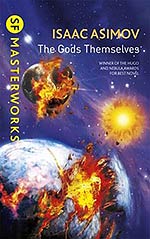
![]() ethawyn
ethawyn
11/28/2008
![]()
Isaac Asimov takes the title of his book, and the subsequent titles of its subsections, from the quotation by Friedrich Schiller, "against stupidty, the gods themselves contend in vain." Asimov's use of this quotation promises and interesting premise that then book ultimately falls quite short of.
In the story, humanity has discovered a source of limitless power that appears to come without consequence. However, one scientist discovers the terrifying truth that this power source threatens to destroy humanity. The novel sets itself up to be an interesting story of the desperate struggle of a few beings to warn humanity that their doom is eminite when humanity just doesn't want to know. This problem, it seems, is one that science can't solve. Humanity will have to make a sacrifice or die.
Asimov unravels the novel throughout the course of three poorly connected sections. The ultimate climax of the story proves, to my mind, incredibly disappointing in the face of the novel's promising setup (and initially apparent theme). I won't spoil the way the story ends, but it left a rather sour taste in my mouth.
Another problem with Asimov's book is one common to science fiction literature written in the 1970s. Asimov, throughout the story, obsessively writes about sex though it has no point to the story. My problem with his portrayal of sex is not from some prudishness on my part (though it does contain a message I happen to disagree with). My problem is that it's written poorly, serves no purpose to the narrative and feels, as my sister put it, "rather like Asimov is an adolescent boy who just discovered sex".
My initial reaction to The Gods Themselves as I began the book was one of extreme excitement. The premise was interesting, the science fiction good and the theme promising, but in the end I found it to be a massive let down. This was surely not Asimov's greatest offering.
http://ethawyn.livejournal.com